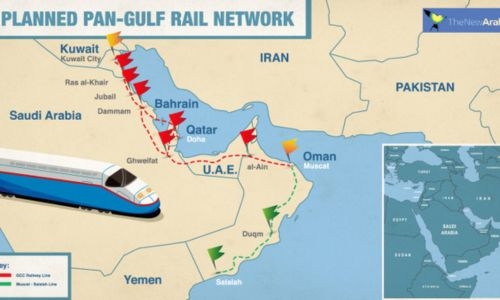The Gulf Railway project, with an estimated cost of $250 billion, has been ranked as the third largest mega-project globally by Statista, a leading market data provider. Scheduled for completion by 2030, this ambitious undertaking will span 21 km into Saudi Arabia and 24 km into Bahrain, crossing the King Hamad Causeway. The Gulf Railway will eventually integrate with the planned Gulf Railway Network, starting from Kuwait and passing through Dammam to Bahrain and beyond. The region’s commitment to infrastructure development is further highlighted by the fact that 50% of Statista’s top 8 mega-projects worldwide are GCC projects.
The Gulf Railway project also includes plans for border crossings, with the line extending from Dammam to Qatar via the Salwa border crossing, connecting Qatar to Bahrain. The railway will then continue from Saudi Arabia to the United Arab Emirates in Abu Dhabi and Al Ain, ultimately reaching Muscat via the Wilayat of Suhar. The momentum for railway projects in the region is clearly gaining ground, with additional high-speed railway lines being considered for connections between Saudi Arabia and Kuwait.
In order to ensure the success of these projects, tenders are currently underway for feasibility studies, detailed design services, and civil works packages for the Gulf Railway project and other key links in the network. A GCC Railways Authority has been established to coordinate efforts between member states and promote seamless integration and operation. Additionally, a joint venture between Oman Rail and Etihad Rail has been formed to implement and operate the line connecting Suhar and Abu Dhabi, further enhancing connectivity within the region.
The GCC’s investment in railway projects not only reflects a commitment to infrastructure development but also a vision for a more connected and sustainable future for the region. With major projects like the Gulf Railway Network and other planned high-speed lines, countries in the Gulf Cooperation Council are positioning themselves as leaders in transportation and connectivity. The integration of these railway networks will not only improve logistics and trade within the region but also facilitate easier travel for residents and tourists alike.
The establishment of the Gulf Railway project and other key railway initiatives in the region is a testament to the GCC’s dedication to economic growth and development. By investing in large-scale infrastructure projects like the Gulf Railway Network, countries in the Gulf Cooperation Council are working towards a more interconnected and prosperous future. These projects will not only create jobs and stimulate economic growth but will also enhance the region’s competitiveness on a global scale, attracting investment and fostering innovation in the transportation sector. The Gulf Railway project and other planned railway connections are paving the way for a more sustainable and connected future for the Gulf region.





















